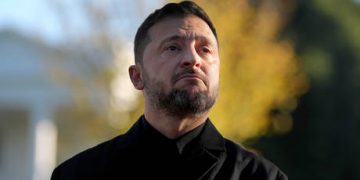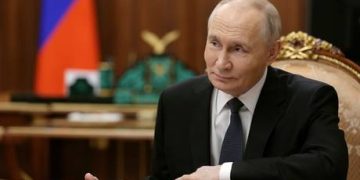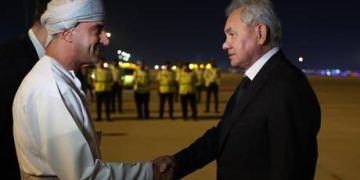August 18, 2025, 1:30 pm
Author – Huda Skaik


Since the beginning of the genocide in Gaza, Israel has repeatedly attacked religious sites, including mosques and churches. In October 2023, only days after the brutal attacks began, the Israeli military struck the Greek Orthodox Church of Saint Porphyrius, the oldest church in Gaza, resulting in the deaths of at least 18 people.
On July 17, 2025, in what survivors describe as a blatant violation of human and religious values, an Israeli fighter jet bombed the Holy Family Church, the only Catholic church in Gaza, without any prior warning. The strike killed three people and injured at least nine others, three of them critically.
Among the dead were Saad Salama, the parish’s 60-year-old janitor; Fumya Ayaad, an 84-year-old woman receiving psychosocial support inside a Caritas tent within the church compound; and Najwa Abu Dawood, 71. Najeeb Tarazi, a man with disabilities, was among the seriously injured. The parish priest, Father Gabriel Romanelli, also suffered a leg wound.
One month after the attack on the church, I spoke to some of the survivors about what they experienced that day — and how they are continuing to survive, and worship, within the walls of Holy Family, which remain standing despite the damage.
Wasn’t This Supposed to Be a Sanctuary?
This was not the first time the Holy Family Church had been targeted. Israeli raids had previously struck the church twice during the ongoing genocide. Since the beginning of the onslaught, the compound had sheltered between 500 and 600 Palestinian Christians — about 200 families — including children, the elderly, and 54 people with disabilities. For them, the church had been a sanctuary amid the destruction and horror.
Father Romanelli was known for his daily calls with the late Pope Francis, who remained in contact with Gaza’s Christians until his death in April 2025. These conversations brought a sense of comfort to the Christian people. Pope Francis had repeatedly condemned Israel’s conduct and even suggested that accusations of genocide in Gaza warranted investigation.

On the morning of the strike, after completing his prayers and a work meeting, Father Romanelli encountered Suhail Abu Dawood, 19, a young postulant of the Institute of the Incarnate Word, on the staircase. When the attack began, Romanelli rushed to help someone else before being injured himself. Suhail sustained a serious shrapnel wound to his side and was hospitalized. Videos circulated on social media later showed Romanelli with his right leg bandaged.
The shelling of the church damaged its compound, and the main church building sustained heavy damage. This latest assault on civilians who had sought safety within the church has left us heartbroken. Israel said, as always, that it regretted the incident, describing it as accidental, and promised an investigation.
“Gone to a Place Where There Is No Pain, No Sorrow”
Shadi Abu Dawood, 46, lost his mother, Najwa, that morning. His son Suhail was critically injured alongside Father Romanelli.
The day before she died, Najwa asked her son to take her picture.

“She told me, ‘Take a photo for me, my son. I want to travel and get treatment,” Shadi said. She had been suffering from a hip fracture since the beginning of the genocide; she could barely walk.
That morning, Shadi went to get bread from a nearby baker. Najwa sat in the courtyard with other women.
“Then came the massacre, exactly at 10 a.m. The scene was horrifying — my mother was covered in blood and wounded in the head. I kept calling her: ‘Mom, wake up, Mom, wake up.’ She’s now gone to a place where there is no pain, no sorrow,” Shadi lamented.
Najwa was known for her deep faith.
“She always taught the children to pray, to love the Bible, and to hold on to faith. She prayed constantly,” Shadi told me. “Attacking churches by the Israeli occupation is unjustified, brutal action. We love peace and call for it.”
A Nephew’s Farewell
Mosa Ayaad, 41, lost his aunt, Fumya Ayaad, 84, in that bombing. “My aunt Fumya was a calm and gentle soul, she loved to pray and served those around her with a warm smile despite the toll of the years,” Mosa said.
Fumya lived deeply rooted in this land, knowing the faces of neighbors and the names of every child in the neighborhood. She shared in people’s joys and sorrows without ever distinguishing between Muslim and Christian.
Over the years, she was honored multiple times for her excellence and creativity. She worked her way up until she became a school principal, always proud to have raised generations of her neighbors. “Though she had no children of her own, her legacy lives on in the thousands of Gazans who learned under her care,” Mosa said.

On the day she was killed, the bombing of the church was sudden and fierce. Explosions shook the building, and rubble rained down on worshippers and displaced people who had sought shelter within the church walls, believing it to be a safe haven. “My aunt died beneath the debris, alongside many others who carried nothing but their faith and a small hope for survival,” he said. “Seeing the church targeted was a wound to the soul. For us, it is not just a building — it is a house of prayer, a house of gathering, a refuge for the weak.”
At that moment, Mosa felt that the attack was not only on the place, but on the spirit that unites us as one community in Gaza. “Here, Muslims and Christians share the same fate: the same fear, the same loss, the same siege. And under these conditions, our bonds grow even stronger, because we are all fighting to survive and to protect what remains of our lives and dignity,” Mosa highlighted.
“Seeing the church targeted was a wound to the soul.”
In Mosa’s work as an administrative coordinator at the al-Ahli Arab Hospital, the day of the church bombing was one of the harshest he has ever experienced. He accompanied a paramedic during rescue efforts, helping to evacuate the injured. “The wounds were severe and varied: deep cuts, burns, fractures. Some victims arrived late because of the shortage of ambulances and transport; some were brought in civilian cars,” continued Mosa. “The hospital was working far beyond its capacity, but we all gave everything we could to save lives, without the luxury of stopping for a moment.”
“This land carries our story and the memory of those who are gone.”
“Despite the genocide and the fear we live through, what keeps me rooted is that this land carries our story and the memory of those who are gone,” Mosa said. His hope comes from ordinary people — from the solidarity of neighbors, from every hand that reaches out to bandage a wound or wipe away a tear.
“This land is us. As long as we live, we will carry it in our hearts and tell its story,” Mosa emphasized.
“We Keep Praying”
Montaser Tarazi, 37, was inside with his family when the missile struck. “We heard a massive explosion. The ground shook. Smoke and ash filled the air. I thought it was the end. I felt terror and deep sadness — especially seeing the children cry.”
The church, he said, was more than a house of worship. “It was a home for everyone who lost theirs. When part of it was destroyed, it felt like our faith itself had been broken. But at the same time, it became even more precious, because it now stands as a witness to our pain.”
“It’s hard to describe pain and anger. Churches should be beyond the reach of war. This was a blow to our faith and our peace of mind,” Tarazi said.
The church “became even more precious, because it now stands as a witness to our pain.”
Despite the devastation, Gaza’s Christian community has refused to fracture. “There was deep grief and tears, but also great solidarity. People helped each other. We keep praying and still hold Mass despite everything — it gives us hope. We are still rooted here, even if every day we wonder if it’s our last,” said Tarazi.
Christians share food, treat each other’s wounds, care for the children, clean the place, and pray together. The church has become a center of life and solidarity for them.
A delegation from the Church of the Holy Sepulchre in Jerusalem visited to check on the injured Christians after the bombing. “Enough silence. We are human beings, not numbers. We want to live in peace on our land and pray safely in our church,” Tarazi said.
Tarazi echoed Mosa, noting that Christians and Muslims share the same fate: “We are one people. We live with the same fear, hunger, and siege. Our bond was strong before, and now it’s even stronger.”
Pope Leo XIV expressed his “profound sorrow” over the Israeli strike on the Catholic parish in Gaza and demanded “an immediate end to the barbarity” in the Strip. Italian Prime Minister Giorgia Meloni directly blamed Israel for the attack. “The strikes against the civilian population that Israel has carried out for months are unacceptable,” she said.
Even amid destruction, Mass is still celebrated in the Holy Family Church. Candles are lit beside shattered windows. Prayers rise above the dust. Children still play in the courtyard, though their laughter is quieter now.
How Many Massacres Before the World Says “Enough”?
What conscience accepts the killing of unarmed civilians who took refuge in churches after losing everything? Attacking places of worship and killing the innocent people inside — a stain on humanity’s conscience.
The Israeli occupation is arrogant: It doesn’t care if you’re Christian or Muslim, nor does it care whether it’s striking a church, a mosque, a home, or even a school. We are living in the midst of a brutal, merciless genocide that swallows everything.
The post Inside Gaza’s Only Catholic Church, One Month After Israel’s Attack appeared first on The Intercept.
Full Article
Author: Huda Skaik











